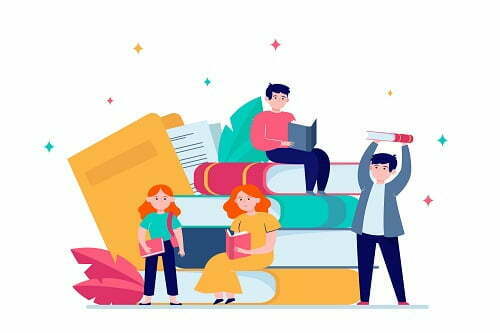Table of Contents
- Here’s everything you need to know about personal development books!
- What are the various personality traits?
- Why should students read personal development books?
- 7 personal development books that every student should read
- The Only Skill That Matters by Jonathan A. Levi
- The Success Principles by Jack Canfield
- Think and Grow Rich by Napoleon Hill
- How to Win Friends and Influence People by Dale Carnegie
- Outliers The Story of Success by Malcolm Gladwell
- The Happiness Project by Gretchen Rubin
- Quiet: The Power of Introverts in a World That Can’t Stop Talking by Susan Cain
- Key takeaways
- FAQs
Here’s everything you need to know about personal development books!
Every person has their own manner of behaving, reacting to emotions, seeing things, and viewing the world. There are no two people who are alike. You may enjoy attending parties, while your friend may prefer to stay at home and read his or her favorite book. It is not necessary that if you enjoy going out to parties, your companion will as well. This is when personal development books come into play.
What a person witnesses during his or her youth and, more crucially, during his or her growing years shape his or her personality. How a person is reared has a significant impact on his or her personality. Personality is nothing more than the accumulation of memories and occurrences throughout a person’s whole life.
Personality development is described as the process of strengthening and growing one’s personality. Development of the personality helps people build confidence and self-esteem. It is also considered to improve communication abilities and the way one perceives the world. As a result of personality development, people tend to have an optimistic attitude.
What are the various personality traits?
Many modern personality psychologists think that there are five basic aspects of personality, which are sometimes referred to as the “Big 5” personality traits. Extraversion (sometimes called extroversion), agreeableness, openness, conscientiousness, and neuroticism are the five basic personality qualities.
- Openness: This personality attribute includes traits like inventiveness and intuition.
- Conscientiousness: This personality attribute is characterized by high levels of thinking, strong impulse control, and goal-directed activities.
- Extraversion (or extroversion): It is a personality attribute that is distinguished by excitability, friendliness, talkativeness, assertiveness, and a high level of emotional expressiveness.
- Agreeableness: Trust, benevolence, friendliness, love, and other prosocial actions are all characteristics of agreeableness.
- Neuroticism: It is a personality characteristic distinguished by sorrow, moodiness, and emotional instability.
Why should students read personal development books?

There is no doubting that life is a rollercoaster of emotions, with everyone going through ups and downs and encountering various experiences that form them into distinct personalities. From our youth, when all we knew was what our parents exposed us to, until the time we took our first steps into school as students, each moment influences our personality and how we view ourselves and the people around us. As students, not only do our friends, parents, and mentors influence us, but the universe of information that we are continuously supplemented with also influences how we think and act.
7 personal development books that every student should read
The Only Skill That Matters by Jonathan A. Levi
Every day, we are bombarded with an enormous amount of information. How can we remain on top of things in order to maintain our employment or adjust to modern life’s new demands? This book provides you with the tools you need to face future problems, whether in your career or personal life. And it’s completely free. You only need to pay for shipping and handling. Jonathan Levi discusses a strategy in the book that promises to help you become a great learner. This method is based on neuroscience. Athletes and high-performing individuals have utilized the tactics to drive them to success. You’ll discover tactics for reading quicker and boosting your ability to retain information on these pages. People who have already read it describe it as a game changer. Get the book if you’re ready to realize your full potential.
The Success Principles by Jack Canfield

Any self-help book reader will recognize Jack Canfield. Jack has been motivating people for years as the author of the popular motivational “Chicken Soup for the Soul” series. Jack provides 65 techniques for changing your life in “Success Principles.” This is the self-help book that will provide you with a ton of amazing suggestions on how to better your life and success. Some of these concepts are recycled versions of ideas that die-hard personal development enthusiasts have heard before. The fundamentals are repeated here simply because they work! This book might be a great refresher on what you need to do to attain the success you want.
Think and Grow Rich by Napoleon Hill
It’s easy to believe that a book about obtaining success published 80 years ago and based on the successful ideas of giants like Andrew Carnegie, Thomas Edison, and Henry Ford is stale and out of date, like a boring history lecture. This is simply not true. While there are portions where current means of implementation must be substituted with old-fashioned counterparts, the essential concepts themselves are founded on human nature and are as valid now as they were 80 years ago. For good reason, this is a classic. Many successful individuals have studied this book throughout the last 80 years and obtained information and insight that has helped them attain their own success. When a self-help book has been around for as long as this one has, there must be a reason for its success.
How to Win Friends and Influence People by Dale Carnegie
Carnegie explores the personal habits that contribute to success in How to Win Friends and Influence People. There are twelve ways to persuade people to agree with you, six ways to make people like you, and nine ways to influence people’s minds without causing animosity. Other people will always be there, regardless of what you aim to do with your life. Carnegie equips you with the tools you need to effectively attract others to your cause, rather than having them potentially be an impediment. A must-read classic about interacting with others.
Outliers The Story of Success by Malcolm Gladwell
Outliers take a scientific look at what it takes to be successful in life. Unlike some of the other books on this list, it does not provide a detailed list of what you must do to attain success. It examines highly intriguing examples that illustrate the book’s fundamental premise, which is that success is not earned by chance, attitude, or even talent but by the time we invest in our skills. People who attain greater levels of success nearly invariably devote more time to developing the talents they need to succeed. This book is pretty entertaining, with some excellent tales and stories. It’s a good book to read.
The Happiness Project by Gretchen Rubin
While one might establish various goals in life, the ultimate goal is to attain happiness. But, because life is such a rollercoaster, we frequently wonder, “What should I do to be happy?” And this is just what Gretchen tries to convey in her book. It all started with Gretchen’s revelation on a wet afternoon while riding the city bus. She understood, “The days are long, but the years are short.” “Time is flying by, and I’m not paying attention to what actually matters.” As a result, she embarked on a path of putting scientific study, wisdom, and teachings laid forth to explain how to be happier to the test. This book is ideal for everyone looking for happiness since it combines ancient philosophy, fascinating and astounding scientific facts, and real-world situations.
Quiet: The Power of Introverts in a World That Can’t Stop Talking by Susan Cain
The title of this book is as catchy as the book itself, if not more so. Many of us have been chastised for being shy or quiet. Introversion has long been connected with a negative meaning. Susan emphasizes in Quiet how society frequently undervalues and misunderstands introverts. There have been many extremely intelligent introverts who have created a fortune for themselves; without them, neither the theory of relativity nor the Apple computer would have been feasible. This book demonstrates how to perceive people as good, regardless of whether they are introverts or extroverts, using well-researched data, logical arguments, and real-life examples.
Key takeaways
- Personal development books provide every ounce of knowledge that a person may require.
- The demand for and availability of personal development books that help people discover and attain their full potential has increased.
- Everyone reads for different reasons; some read to become lost in the world of fiction, while others are continuously looking for fantasy novels to better their vocabulary and grammar.
- But, if your goal is to make little but major changes in your behavior, we are confident that, if not all, at least one of these 7 best personal development books will do the trick!
Was this blog informative? If so, please share your thoughts in the comments below. Click here to reach out to us for more information on different personality development books. We would be happy to assist you with your queries!
Liked this blog? Read: Best science books | Here are the books to satisfy your scientific quest
FAQs
Q1. Do personal development books help?
Answer: It will help you become more professional as well as personally more effective. If you can practice these habits, you will see the world in a different way, and you will learn about the path to a successful life.
Q2. How many personal development books are there?
Answer: The number of such books is steadily increasing. Therefore, it’s difficult to know the exact number of self-improvement books. However, the number of unique ISBNs has grown from 30,897 in 2014 to 85,253 in 2019.
Q3. What are self-help books called?
Answer: A self-help book is one that is written with the intention of instructing its readers on solving personal problems. The books take their name from Self-Help, an 1859 best-seller by Samuel Smiles, but are also known and classified under “self-improvement,” a term that is a modernized version of self-help.






